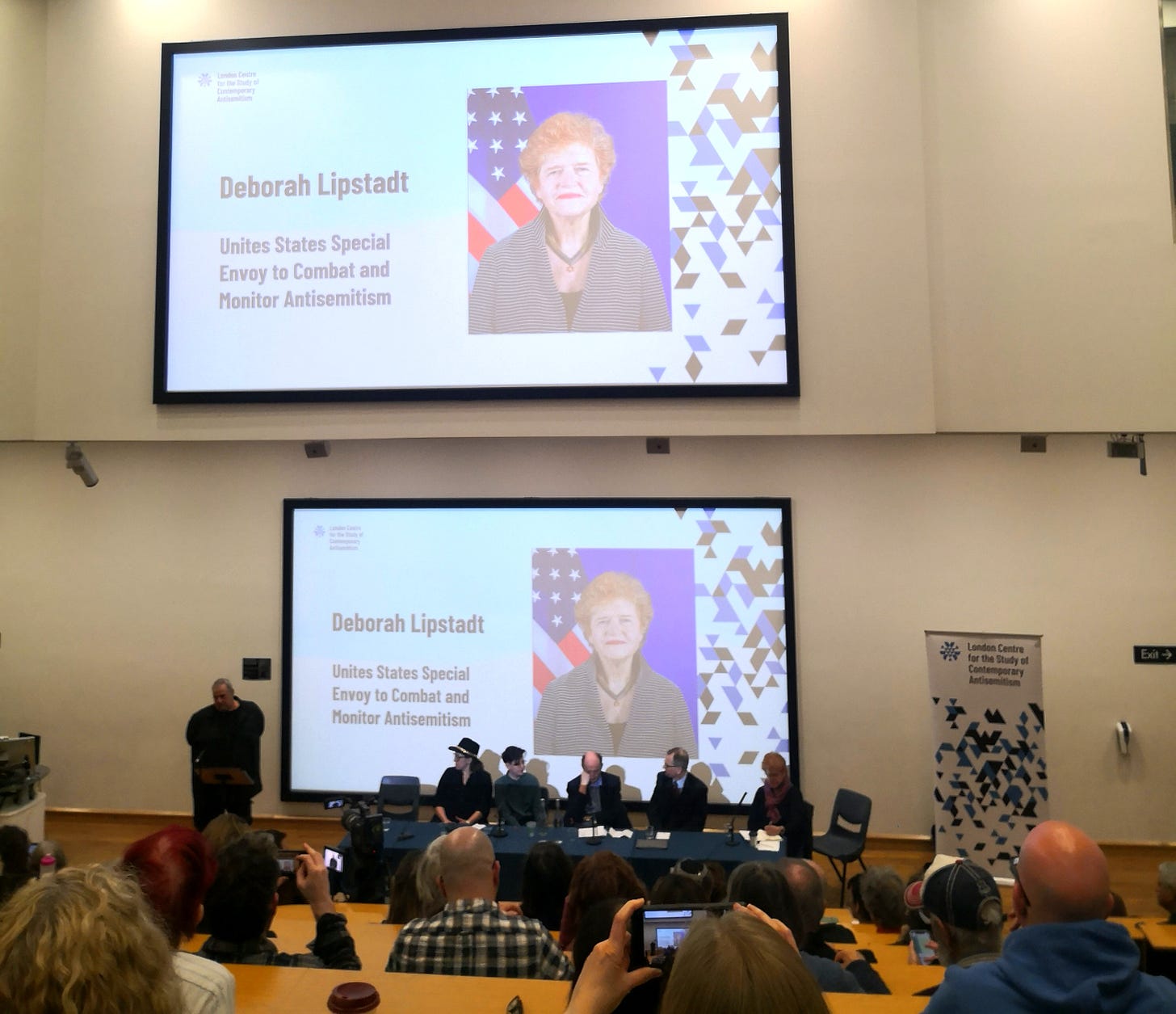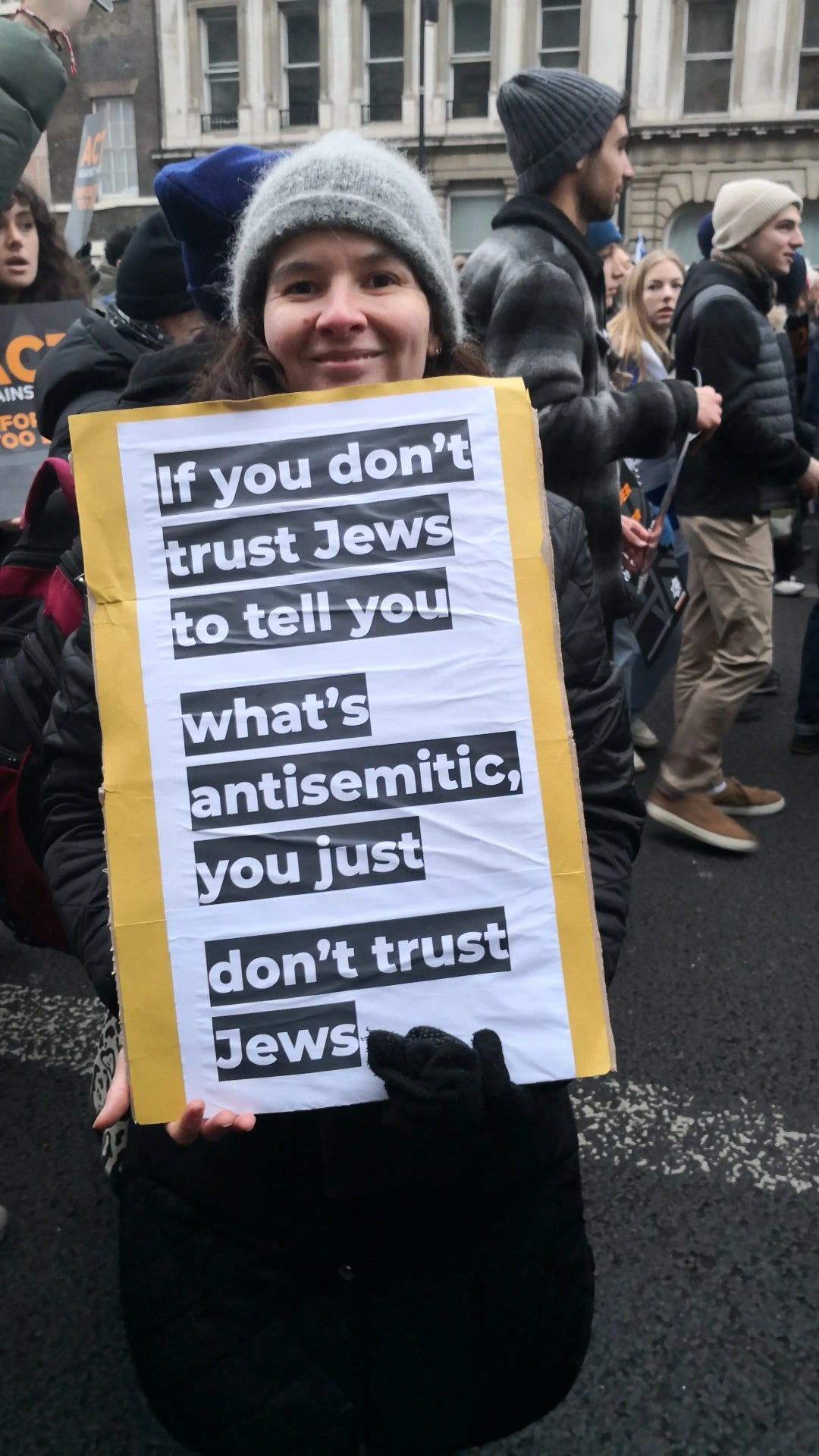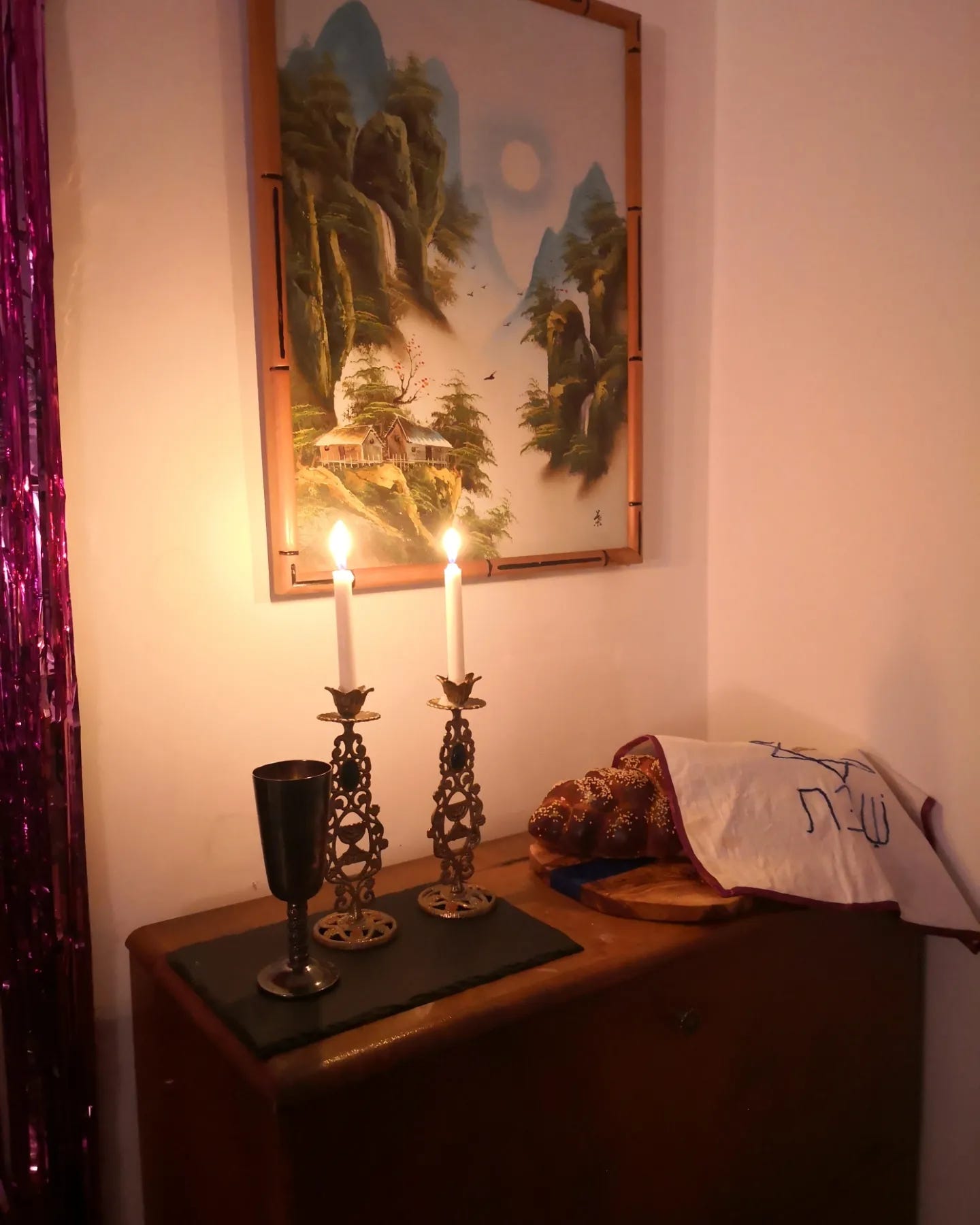This morning I went to a panel on antisemitism. The star speaker was Deborah Lipstadt, US special envoy to monitor and combat antisemitism; the others, all academics who have contributed to an upcoming three-volume anthology from the London Centre for the Study of Contemporary Antisemitism (LCSCA) in response to the October 7 attacks. I’ve been to a number of talks like this recently. I find them comforting.
“The danger is when ‘the threat’ becomes the raison d’etre of your identity” – Deborah Lipstadt
Sometimes I feel like all I do is talk about antisemitism – especially online. But I can’t stop. My whole feed is full of it. Every day, a new outrage – a new attack, a new slander, a new chant, a new call for our exclusion, expulsion, extermination. It can feel exhausting – or at least it did. Now it just kind of washes over me. And anyway, it’s not all bad; in the last few years I’ve connected with lots of loud, proud, articulate, funny (of course) Jews from all over the world. They’ve given me the knowledge and strength and often, the content, to keep going – to keep trying to raise awareness, in my own little way, about the level of antisemitic threat we are facing right now.
The shame. I can only imagine what people who only ‘see’ me on social media must think. I worry about being blacklisted; that some editors and publications might now have a mark against my name, or that if I pitch to someone new, they’ll be put off by my views – which, to be clear, amount to: anti-Jewish racism exists and it is wrong and should be called out and fought wherever it rears its head; Jews are native to the land of Israel, and have a right to self-determination on some part of that land. (Yes, I’m a Jew and a Zionist. Do you think it’s right that even typing that sentence makes me feel slightly terrified?).
Ech. What am I doing here? What am I trying to say?
It wasn’t always like this. Life slowly taught me that if I wanted to live as a proud, confident Jew, I would have to learn to fight antisemitism – and that meant understanding it. As I’ve written before many times, I first experienced antisemitism in secondary school – around the age of 14/15 I guess. A girl in my class asked to borrow some money at break time, and when I gave it to her, she made a comment that I can’t quite remember and didn’t quite understand, but somehow knew amounted to: Jews are cheap. [As an aside: since then, I have spent my life desperately trying not to appear cheap or ungenerous or overly concerned with money in any way, especially if I don’t know a person very well or think they hold prejudices against Jews. This has resulted situations like: me lending people money and being too afraid to ask for it back, leaving babysitting jobs without being paid, taking fucking ages to send invoices. Fun!].
After that, the next time I experienced antisemitism was at uni. This was the first time that I heard conspiracy fantasies about Jewish power and 9/11, The Protocols of the Elders of Zion and Black Hebrew Israelite narratives. It was, to say the least, a shock – to find out that so many people thought so many completely insane, hateful and messed-up things about Jews. Me and my family. Because honestly, it is all so far from the Jews and Judaism I know to be true.
“Antisemitism is irrational. [Arguing with an antisemite] is a fool’s errand” – Deborah Lipstadt
A fool’s errand it might be, but I cannot describe the feeling of sitting in a room where people are enthusiastically sharing the most insane anti-Jewish conspiracy myths [myths not theories, Lipstadt told us, because theories can be proven] and knowing with all your heart and soul that they are racist bullshit, but not knowing the arguments as to how or why.
The first time I ever wrote about antisemitism – or really Jewish identity at all – was in 2014 for The Debrief (RIP). It was the push I needed to finally start the work, and my journey – to learning enough about antisemitism to be able to confidently advocate for myself, my family and my people – had begun. (So a sincere thank you to the women who commissioned it).
“It’s a growth sector” – Deborah Lipstadt
… quipped in her opening remarks today – and I guess you see that in my story too. Since 2014, antisemitism has continued to increase, spreading as it does like a virus, shifting and mutating to suit the tastes of its believers.
No, educating myself about antisemitism over the last decade has not been in vain. Far from it. One of the things – the key thing, really – that has kept me sane as antisemitism has continued to gain traction, is learning everything I can about it; how it works, where it comes from, who thinks what, why… you get the picture. Knowledge is power, after all. In fact, one of the problems, I think, when it comes to talking to people about antisemitism or explaining why something is antisemitic, is that there is just so much to learn, so much context. Over 2000 years of conspiracy fantasies and blood libels and expulsions and pogroms and attempts to wipe us off the planet. It’s endless and endless and endless, the same story told a million different ways in a million different times and places.
“It’s frightening. It’s very different to what we’ve ever seen…” – Deborah Lipstadt
One of Lipstadt’s fellow panellists, the always insightful Philip Spencer, spoke passionately about this too. What is so different about this current wave of antisemitism, compared to all the previous ones? The difference? From Europe to America, the Middle East to the Far East, South America to Scandinavia, Africa to Australia; from the far-right to the far-left – all are now fluent in the language of anti-Jewish hatred. We are facing a truly global threat (you gotta love that internet!). We have never been here before.
“... but it’s not the 1930s” – Deborah Lipstadt
It’s funny, while we were waiting for the talk to begin, the woman in front of us was chatting away and said that she thinks that we shouldn’t allow Israeli flags at protests about antisemitism because it sends the wrong message. We can’t complain that people conflate Jews with Israel, and then muddy the waters ourselves. Personally I disagree. The water was muddied the second that Israel, the world’s only Jewish country, became the global synonym for evil. Oh sorry, my bad: that’s Zionism. Doh.
Speaking of which: when Deborah Lipstadt said, “but it’s not the 1930s” she was referring to the fact that currently, Jews in the diaspora are protected by our governments (“but for how long?” Philip Spencer wondered). But the other thing that is different between now and the 1930s, is that now we have Israel. And it’s not perfect (honestly, I’m begging you, find me a country that is), and it’s surrounded by enemies, but it is the one place on this earth where you can live as a Jew, and not have to worry that you’re suddenly going to be living under an antisemitic regime (although yes, Netanyahu is a cunt, so living under his rule is not ideal either, but the point still stands). That’s why, despite the fact that it’s currently at war and demonised around the world, Israel still feels like a safe haven for so many Jews – me included.
But anyway… I’ve strayed, rambled, ranted – and over 1,000 words later am still no closer to answering the question…
Has antisemitism become the raison d’etre of my identity?
To quote Vicky Pollard (the creation of Matt Lucas, another brilliant Jew): “No but, yeah but, no but…”.
No but… I live a full life. I’m blessed with a richness of family and friends, and my big love, Greg, and my little love, Pops (vom. I know. I’m sorry). I’m a dedicated disciple of yoga and the Gilmore Girls, and spend a huge number of my waking hours thinking about what I’m going to eat next. As for my Jewish identity, I nurture that too; making Shabbat, going to shul, celebrating the festivals, and stuffing my face with challah and rugelach and bagels on the regs.
Yeah but… if I’m being completely honest, antisemitism does, at times, become the raison d’etre of my social media identity (and in this age, are any of us much more than what we post online?). I am that angry Jew, screaming into the void. Or at least, I’m sure that’s what some people see – and that doesn’t feel great, in many ways.
No but… I never started any of this – learning about antisemitism, writing about antisemitism, posting about antisemitism – because I wanted to. I had to. I had to fight. And that feeling has only grown stronger. (As I’m sure many of you already know by now) Jews are just 0.2% of the global population – around 15.7 million people. In the digital age, this means that when incredibly influential celebrities like the Hadid sisters – Gigi Hadid (78.4 million Instagram followers), Bella Hadid (60.9 million Instagram followers) – or Kanye West (19.8 million followers) share antisemitic posts, these ideas reach more people than there are Jews on earth. That is pretty fucking terrifying.
But as much as I can make excuses and argue it all away, I’d be a fool not to heed Lipstadt’s warning. It’s complicated. No part of me wants to stop learning or talking about antisemitism, or trying to combat disinformation within my tiny sphere of digital influence. But I also don’t want to let it define me. I don’t really have all answers right now, but I will try to move forward with Lipstadt’s words ringing in my ears, reminding me that letting other people’s hate define your life is no way to live. I guess that’s a start.






